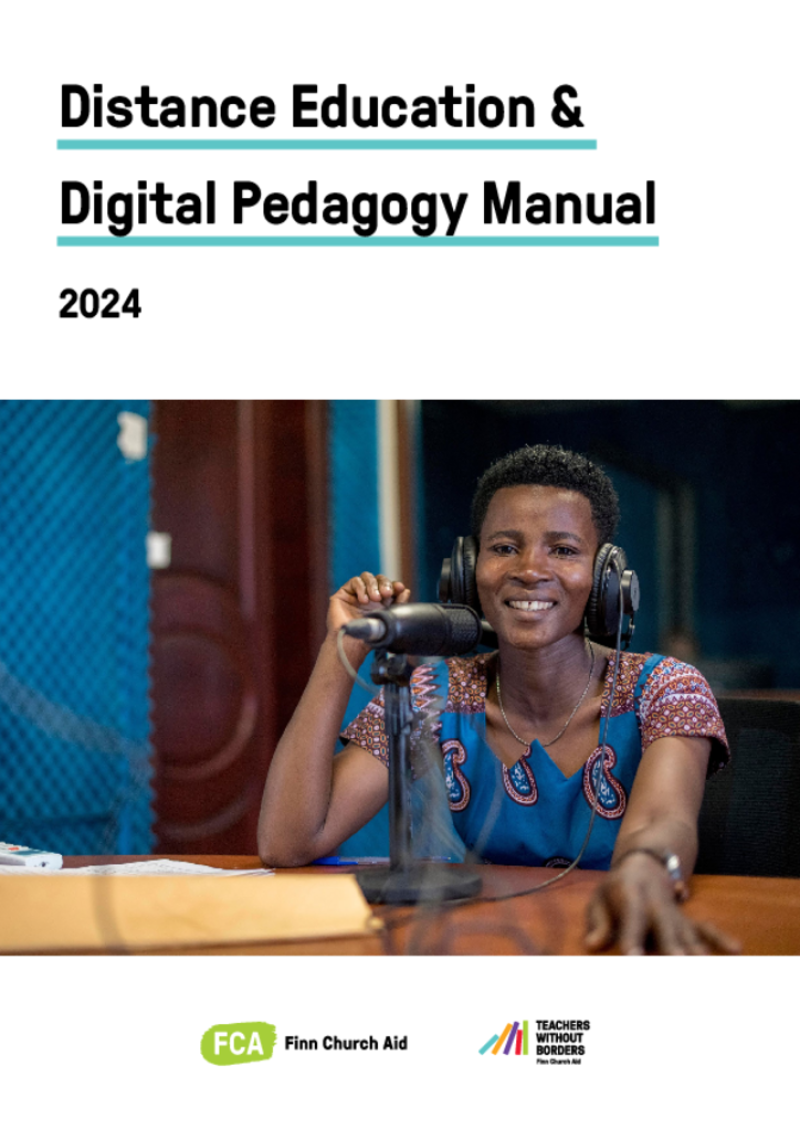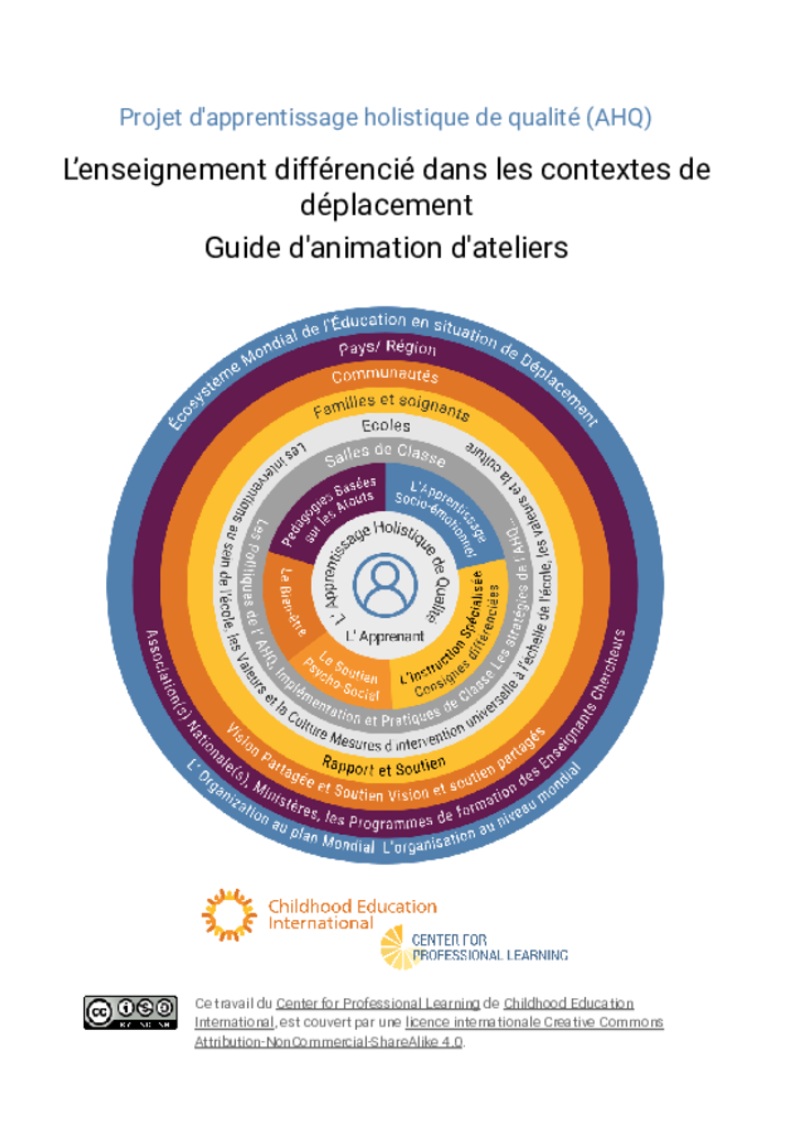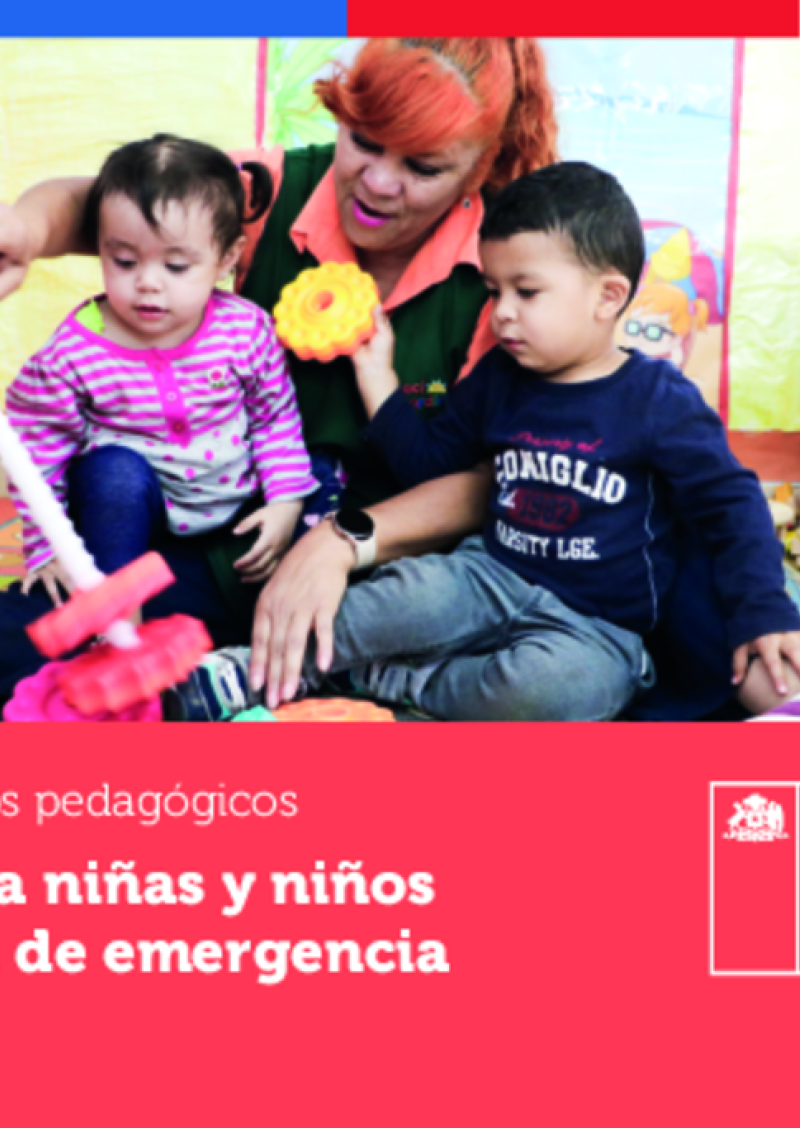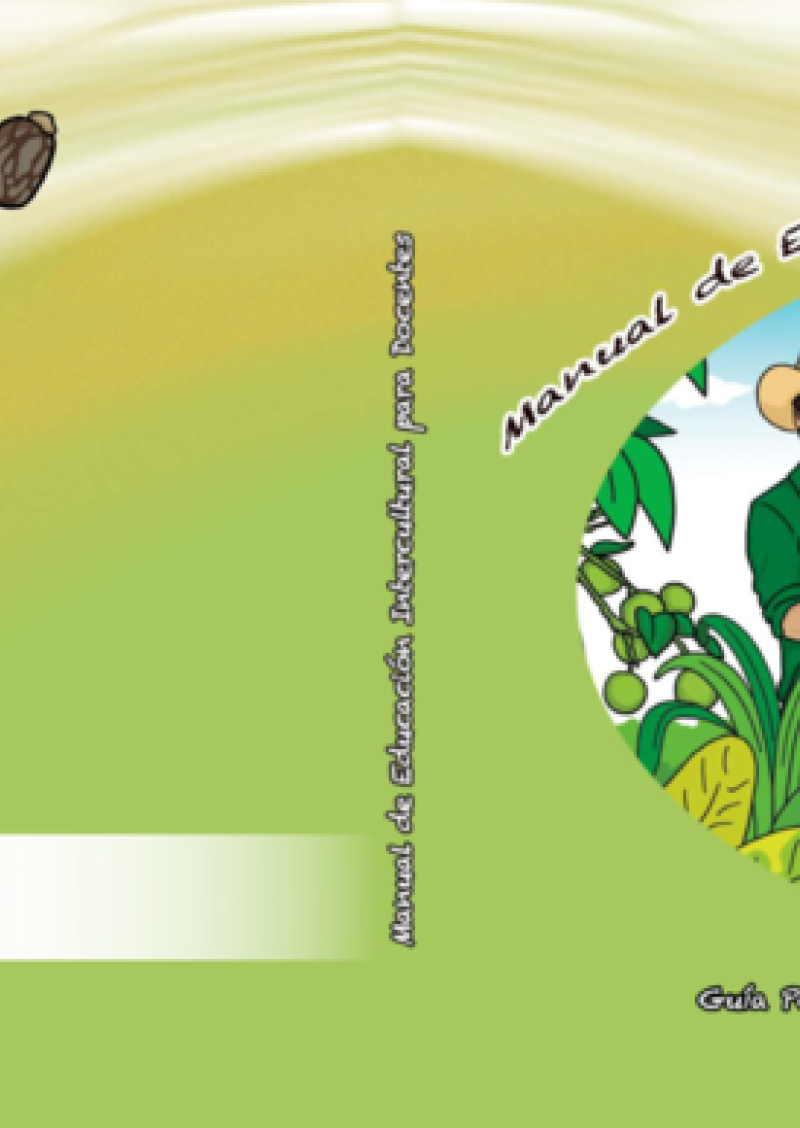Centre de Ressources pour les Enseignants
Affichage de 1 à 20 sur 22
FCA & TWB Distance Education & Digital Pedagogy Manual
This teacher training manual on Distance Education & Digital Pedagogy supports teachers and other education personnel’s continuous professional development in pedagogically high-quality distance education and remote learning especially in diverse, low resource contexts and is adaptable for use anywhere in the world.
The manual has been developed by Finn Church Aid (FCA) and Teachers Without Borders (TWB) Finland. The development of the training materials began already in 2020 as a response to the school lock-down situations caused by the COVID-19 pandemic, when teachers and learners quickly had to adapt to remote education modalities. Even though the pandemic has subsided, the need for quality distance education prevails. Ensuring the continuity of learning for all learners is critical in all contexts, even and especially during crisis situations.
The training manual consists of eight (8) training modules that can be used flexibly:
- Distance Education,
- Distance Education Modalities,
- Pedagogy of Digital and Distance Education,
- Psychosocial and Emotional Wellbeing,
- Learner-Centred Methods in Distance Education,
- Home Support – Parents and Caregivers’ Role and Collaboration,
- Inclusive Education, and
- Assessment and Evaluation.
The content design allows the trainer or facilitator to pick individual modules or sessions and adapt the training content according to the context and target group’s needs.
We hope you find it useful!
L’enseignement différencié dans les contextes de déplacement. Guide d’animation d’ateliers
Dans ce guide, vous trouverez des stimuli qui vous aideront à explorer le contenu et à l'appliquer au contexte local. Vous y trouverez également des conseils qui aideront les éducateurs à allouer de l'espace et du temps pour l'apprentissage professionnel dans leur vie chargée et souvent stressante. Enfin, nous proposons quelques conseils sur les aspects en ligne et/ou technologiques de cette formation.
Le projet d'apprentissage holistique de qualité (AHQ), dont cet atelier en face-à-face est l'un des éléments, vise à préparer les éducateurs à dispenser des leçons de haute qualité qui soutiennent la formation holistique pour les enfants et les jeunes d'origines diverses (réfugiés, migrants et/ou citoyens) dans les pays d'accueil, les situations de déplacement et les contextes de crise. Nous définissons l'apprentissage holistique de qualité comme celui dont l’objectif est :
- le développement scolaire, cognitif et identitaire,
- l'apprentissage socio-émotionnel, et
- le bien-être mental / psychosocial et physique et qui délivre: des expériences scolaires positives, un sentiment d'appartenance et de sécurité, la croissance et le développement, et des résultats équitables pour tous les apprenants.
Introduction aux Pédagogies Basées sur les Atouts dans les Contextes de Déplacement Guide d’Animation d’Ateliers
Ce manuel est destiné à soutenir l'organisation d'un atelier d'une journée sur le thème du soutien à l'apprentissage holistique de qualité dans les contextes de crise par la mise en œuvre d'outils et d'activités pédagogiques basés sur les atouts et par le maintien d'espaces d'apprentissage sûrs et sécurisés. Les ateliers sont le résultat des contributions d'une équipe engagée d'enseignants et d'éducateurs du Kenya, du Liban et du Niger.
Le projet d'Apprentissage Holistique de Qualité (AHQ), dont cet atelier en face-à-face est un élément, vise à préparer les éducateurs à dispenser des cours de haute qualité qui soutiennent la formation holistique pour les enfants et les jeunes de divers horizons (réfugiés, immigrants, citoyens) dans le pays hôte, les déplacements et les contextes de crise.
Nous définissons l'apprentissage holistique de qualité comme celui qui vise à:
- un développement scolaire, cognitif et identitaire,
- un apprentissage socio-émotionnel, et
- un bien-être mental/psychosocial et physique et qui délivre : des expériences scolaires positives, un sentiment d'appartenance et de sécurité, la croissance et le développement, et des résultats équitables pour tous les apprenants.
Integrating SEL & PSS into Lessons for Quality Holistic Learning
This open, self-paced course, Integrating SEL & PSS into Lessons for Quality Holistic Learning, was designed with a team of teachers working with refugee and vulnerable learners across Lebanon. It is intended to build upon previous learning related to social and emotional learning (SEL) and psychosocial support (PSS) to provide teachers with the confidence to critically evaluate activities, adapt them to their local context, and assess impact on student learning and well-being.
Educators who complete this online course will be able to:
- Define the concepts PSS and SEL.
- Integrate PSS and SEL in lesson plans.
- Create safe spaces for displaced learners, refugees, and other vulnerable students.
- Reflect on tools and teaching pedagogies when implementing PSS and SEL activities.
- Evaluate their adaptation and implementation of PSS and SEL activities.
It will take 8-10 hours, on average, to complete this course. It is entirely self-paced. There is a micro-credential opportunity shared at the end of the course for those interested in demonstrating their competency and earning a digital micro-credential and badge.
Pédagogies basées sur les atouts (force) pour un apprentissage holistique de qualité
Ce cours et ouvert et de auto-rythmé, “L’apprentissage holistique de qualité”, a été conçu par des enseignants pour des enseignants, en particulier ceux qui travaillent avec des apprenants réfugiés et vulnérables. Il vise à donner un aperçu de la terminologie, des concepts et des pratiques clés liés aux pédagogies fondées sur les actifs/ les forces.
Les éducateurs qui suivent ce court cours en ligne :
-
acquérir une compréhension pratique de ce que sont les pédagogies basées sur les actifs et pourquoi elles sont importantes
-
être en mesure d’identifier les moyens par lesquels les pédagogies basées sur les actifs peuvent être appliquées en classe
-
examiner comment appliquer des pédagogies basées sur les actifs dans le contexte de leur propre travail
Le cours prendra en moyenne 3-4 heures à compléter.. Un certificat de participation sera délivré en cas de réussite. Merci de votre intérêt et de votre engagement envers votre apprentissage professionnel et votre enseignement!
Un manuel d’utilisation hors ligne est en cours d’élaboration, en tant qu’outil parallèle d’apprentissage des pédagogies basées sur les actifs. Veuillez communiquer avec jkasper@ceinternational1892.org pour discuter de la mise à l’essai de ce matériel supplémentaire.
Introduction à l’apprentissage social et émotionnel et au soutien psychosocial
Ce cours ouvert et auto-rythmé, Introduction à l’apprentissage socio-émotionnel et au soutien psychosocial pour un apprentissage holistique de qualité, a été conçu avec une équipe d’enseignants travaillant avec des apprenants réfugiés et vulnérables au Niger. Il vise à donner un aperçu de la terminologie, des concepts et des pratiques clés liés à l’apprentissage socio-émotionnel et au soutien psychosocial.
Les éducateurs qui suivent ce cours en ligne :
-
comprendront l’importance de créer un environnement sûr et inclusif pour le bien-être et l’apprentissage des enfants dans les situations d’urgence
-
comprendront les principes de base du soutien psychosocial (SPS) et de l’apprentissage socio-émotionnel (SEL) et leur rôle dans le soutien aux élèves dans des contextes déplacés, en particulier compte tenu des élèves uniques de l’éducateur et du contexte d’apprentissage
-
pourront intégrer des interventions PSS simples et applicables et des activités SEL dans leurs plans de leçon pour assurer un apprentissage holistique de qualité
Il faudra en moyenne 4 à 5 heures pour terminer ce cours. Un certificat de participation sera délivré en cas de réussite. Merci de votre intérêt et de votre engagement envers votre apprentissage professionnel et votre enseignement!
Une série d’ateliers guidés PowerPoint hors ligne, sur laquelle ce cours est basé, est également disponible à des fins de formation. Veuillez communiquer avec jkasper@ceinternational1892.org pour discuter de la mise à l’essai de ce matériel d’atelier.
Ficha para equipos pedagógicos - Acompañar a niñas y niños en situación de emergencia
Este recurso para docentes ofrece ejemplos y materiales adicionales para apoyar a los educadores que trabajan con niños de parvulario en situaciones de emergencia. Las comunidades pueden enfrentar momentos de crisis los cuales afectan a los niños en sus contextos familiares, educativos y comunitarios. La guía ayuda a identificar estos efectos adversos y proporciona apoyo oportuno para mitigar el impacto en los niños, uno de los grupos más vulnerables en estas situaciones.
Play & resilience: a toolkit for teachers, caregivers, and other stakeholders
Play is an easy, natural and universal practice that builds resilience. Play comes naturally to all children- and is a seemingly simple and light-hearted phenomenon. The power of play as a pathway to building resilience needs to be leveraged to provide children with the opportunity to further explore play in their home and school environments.
This toolkit is therefore premised on the objectives to build the capacity of various stakeholders such as caregivers/teachers, school managers, curriculum planners and policy makers who are key actors in the process of growth and development of children. It is also aimed at equipping these stakeholders with the knowledge and pedagogical skills to translate research, policy and curriculum to practical knowledge and activities for children in the school environment. The toolkit offers directions for facilitators who will be working with caregivers/teachers using the materials and resources provided and other relevant materials available in an environment where it will be used.
Pedagogies of Belonging: Educators Building Welcoming Communities in Settings of Conflict and Migration
What would it take to ensure that all young people have access to learning that enables them to feel a sense of belonging and prepares them to help build more peaceful and equitable futures? This is a question we have found educators in contexts of conflict and migration ask of themselves each day. And each day, in classrooms around the world, educators are acting in response to this question.
Educators are figuring out what to teach, ways to teach, and how to foster relationships of learning and belonging.
We learn from educators how they create space for dissent, for dialogue, for trust, for new identities, for future-building, and how they envision and build newly imagined and welcoming communities.
Pedagogies of belonging, featured in this book and in its title, emerge from these ways of thinking and acting by educators. We see across educators that what they teach, how they teach, and why they teach in the ways they do come together to enable all young people to feel a sense of belonging and prepare them to help build more peaceful and equitable futures.
This book is about educators and for educators. It is about the practices educators have developed to create welcoming communities in settings of conflict and migration. Each chapter is a “microportrait” of one educator who we have come to know by spending time in their classroom and school.
We focus on the why and the how of practices educators use. We show, through text and art, how educators learn about their students’ experiences, needs, and desires. We describe how educators develop practices to meet these learning and belonging goals. And we recognize how educators address struggles that necessarily arise in this work. We hope the practices give us each ideas to try out in our own classrooms, schools, and other educational sites.
Each microportrait is grounded in research about educator practices. Authors of the microportraits came to know the educators through research projects that included interviews, observations, and sometimes participatory methods. Each project was at least a few months and at times spanned many years. The microportraits include links to articles that can support deeper learning about the contexts and practices of the educators.
This book is a collective project, and we welcome your participation. The intention of this book is that it lives and grows to include more microportraits over time and more patterns of practices that may emerge. Please be in touch with suggestions, to share your experiences with the practices of these educators, or to contribute a microportrait to the collection.
Manual de Educación Intercultural para Docentes
Este Manual a destinación de los docentes propone actividades y talleres con enfoque en la interculturalidad para realizar en el aula. Se divide en cuatro apartados: identidad colectiva e individual; el conocimiento de la historia y de las distintas manifestaciones culturales para fomentar la paz en el país; estereotipos y prejuicios para combatir las discriminaciones y el racismo; e interculturalidad para valorizar la diversidad y la convivencia.
Kit pédagogique - Idées, ressources, méthodes et activités pour l'éducation interculturelle informelle avec des adultes et des jeunes
Il s’agit de la réédition mise à jour d’un manuel originellement publié en 1995 dans le cadre de la Campagne Européenne de la Jeunesse contre le Racisme, la Xénophobie, l’Antisémitisme et l’Intolérance. Le document est pensé comme un outil accessible aux praticiens de l’éducation informelle auprès d’un public d’âge varié. Il est divisé en 2 parties : la première offre le contexte et le cadre pour aborder les activités et méthodes proposées dans la seconde partie. On y retrouve également une liste de documents écrits et audiovisuels en différentes langues parlées au sein de l’Europe mobilisable dans des cadres éducatifs.
Addressing anti-semitism in schools: training curriculum for secondary education teachers
This publication is part of a four-volume set of training curricula to address anti-Semitism in schools. This volume focuses on the training curriculum for secondary education teachers. Each volume in this set aims to assist trainers in the field of education globally to work effectively towards strengthening the capacity of teachers to prevent and respond to antiSemitism, this specific and highly dangerous type of prejudice directed at Jewish people. In this sense, the curriculum addresses anti-Semitic prejudice and perceptions of Jews, phenomena which often also fulfil a social and political function in societies around the world; it is not material aimed at preparing teachers for intercultural dialogue.
Addressing anti-semitism in schools: training curriculum for vocational education teachers
This publication is part of a four-volume set of training curricula to address anti-Semitism in schools. This volume focuses on the training curriculum for vocational education teachers. Each volume in this set aims to assist trainers in the field of education globally to work effectively towards strengthening the capacity of teachers to prevent and respond to antiSemitism, this specific and highly dangerous type of prejudice directed at Jewish people. In this sense, the curriculum addresses anti-Semitic prejudice and perceptions of Jews, phenomena which often also fulfil a social and political function in societies around the world; it is not material aimed at preparing teachers for intercultural dialogue.
Addressing anti-semitism in schools: training curriculum for school directors
This publication is part of a four-volume set of training curricula to address anti-Semitism in schools. This volume focuses on the training curriculum for school directors. Each volume in this set aims to assist trainers in the field of education globally to work effectively towards strengthening the capacity of teachers to prevent and respond to antiSemitism, this specific and highly dangerous type of prejudice directed at Jewish people. In this sense, the curriculum addresses anti-Semitic prejudice and perceptions of Jews, phenomena which often also fulfil a social and political function in societies around the world; it is not material aimed at preparing teachers for intercultural dialogue.
Addressing anti-semitism in schools: training curriculum for primary education teachers
This publication is part of a four-volume set of training curricula to address anti-Semitism in schools. This volume focuses on the training curriculum for primary education teachers. Each volume in this set aims to assist trainers in the field of education globally to work effectively towards strengthening the capacity of teachers to prevent and respond to antiSemitism, this specific and highly dangerous type of prejudice directed at Jewish people. In this sense, the curriculum addresses anti-Semitic prejudice and perceptions of Jews, phenomena which often also fulfil a social and political function in societies around the world; it is not material aimed at preparing teachers for intercultural dialogue.
Dear Kitty: teacher's guide for the film Where is Anne Frank?
This guide provides teachers with the necessary tools to highlight historical and current themes from the animated film "Where is Anne Frank".
It includes a preparatory lesson, a lesson to discuss the film and four detailed thematic follow-up lessons. The film and the lessons are accompanied by extensive background information and ready-to-use worksheets with information, questions and assignments.
Recommendations for teaching and learning about the Holocaust
Benefiting from the expertise of delegates from more than 30 member countries, the IHRA Recommendations for Teaching and Learning about the Holocaust are intended to provide a basis for policymakers, practitioners, and educators that will help them:
1. Develop knowledge of the Holocaust, ensuring accuracy in individual understanding and knowledge and raising awareness about the possible consequences of antisemitism;
2. Create engaging teaching environments for learning about the Holocaust;
3. Promote critical and reflective thinking about the Holocaust including the ability to counter Holocaust denial and distortion;
4. Contribute to Human Rights and genocide prevention education
Mobile mentoring for primary school teachers in crisis contexts
The following curriculum provides the content for a new mobile mentoring initiative developed to accompany the Teachers in Crisis Contexts Working Group ‘Training for primary school teachers in crisis contexts’ (https://trc-dev.gn.apc.org/professional-development-materials-and-opportunities/training-primary-school-teachers-crisis). The material is intended to provide additional layers of instructional and emotional support via mobile technology to inexperienced and under trained teachers in the most difficult of teaching contexts.
It has been designed to support both the Initial Training Pack and the Extended Training Pack and builds on the competency areas covered in both sets of trainings; ‘Teacher Role and Well Being’, ‘Child Protection, Well-being and Inclusion’, ‘Pedagogy’, ‘Curriculum and Planning’. The content provides teaching tips, motivational messages, reflection and discussion questions, plus images and video suggestions.
Training for primary school teachers in crisis contexts
The training pack responds to a critical gap in open source, competency based teacher training materials that provide coverage of foundational knowledge and skills required by teachers in crisis contexts, where teacher training is often limited to ad hoc workshops. The pack provides the basis for an in-service training program which can be used in its entirety to prepare unqualified teachers, but is also flexible enough for adaptation and use of selected modules or sessions according to the contextual needs of teachers. The pack provides foundational teacher training content on Teacher’s Role & Well-being; Child Protection, Well-being & Inclusion; Pedagogy; Curriculum & Planning; and Subject Knowledge.













